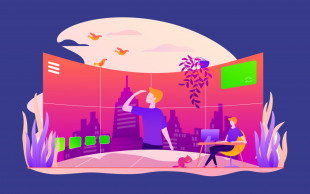Dean Yeong, a writer and entrepreneur at deanyeong.com shares with us how to overcome procrastination in 2 minutes without fighting with your lizard brain.
Last week, I found myself watching more YouTube videos than usual and have been putting off work for some time. Just like everyone else, I procrastinate. And trust me, it happens more times than you think.
If you’ve found yourself putting off important tasks over and over again and you can’t control it, you’re not alone. In fact, it isn’t a bad thing for most people to procrastinate to a certain degree – but procrastination has affected some people chronically and destroyed their relationship, career, and life.
Many factors cause us to procrastinate. However, I’m only going to talk about one of the many here. This article may take you 2 minutes to read. So here comes the first test for you: stop procrastinating and start reading.
The Lizard Brain
One of the biggest factors behind procrastination is the way our mind is wired to crave for instant gratification and perfection. We want fast, good results and pleasure without putting in the work. This then translates itself into our work and life:
- We can’t start writing because it takes a long time to complete an article.
- Training for strength is a long journey, such that most people end up never stepping into the gym.
- You procrastinate on cleaning your room because you perceive it is going to take up a long time.
Most people are trying to fight this behavior with external motivations, cruel punishments, and sheer willpower. The problem is, this part of our brain (which is what I like to call the lizard brain) had evolved from the beginning of the first species on land – the reptile.
The lizard brain had kept animals (and us) safe for around 300 million years, while the newly developed human brain only has its history of 200,000 years. Trying to enforce willpower and self-discipline on our lizard brain is like a baby fighting an MMA champion.
How the 2-minute Hack Works
The 2-minute hack works like this:
When you find yourself procrastinating, forget about the task you need to get done. Then, think about the first 2 minutes of that task. For example:
- To write an article, the first 2 minutes is to write a paragraph.
- To hit the gym, the first 2 minutes is to put on your sports shoes.
- To read a book, the first 2 minutes is to read half of the page.
After you figure out the first 2 minutes of the task you’re procrastinating, do it. The rule is simple, if you don’t feel like doing it after 2 minutes, you’re free to stop without guilt.
In most cases after the first 2 minutes, you will continue working on the things you’ve been procrastinating.
Why it Works
Activation energy is a term widely used in Chemistry, describing the minimum quantity energy that a reacting subject must possess to undergo a specified reaction. This same term is applicable in our daily productivity.
The 2-minute hack isn’t any magic.
To get ourselves to start doing something, we need energy that is bigger than the task. However, many healthy habits we like to practice are challenging to start because their required activation energy is high and hence the resistance is high.
The 2-minute hack lowers the resistance because now, instead of thinking about the big to-do you need to get done, you’re focusing only on the first 2 minutes of it. When you complete the first two minutes, the momentum will carry you forward to finish the entire task.
Why Small Action Wins
I have to admit that I lied. This article isn’t a 2-minute read. But if you’re reading this now, you have just experienced how effective the 2-minute hack is.
There is no way for us to win the fight with our lizard brain. So instead of fighting it and forcing yourself to do something, work around the corners.
When you think of the great things you want to achieve, acknowledge that they don’t happen by themselves, and they certainly don’t happen overnight. The best way to get to where you want to be isn’t visualizing your way to it, the only way to get there is by taking action.
And you don’t need significant action either, all you need is just a small tiny action that puts you a step forward, 2 minutes at a time.
Dean Yeong study people from various backgrounds. This includes top athletes, bestselling writers to successful entrepreneurs. He strives to uncover how they think, work, and live and shares his insights and lessons learned on his newsletter—Monday Digest.

















